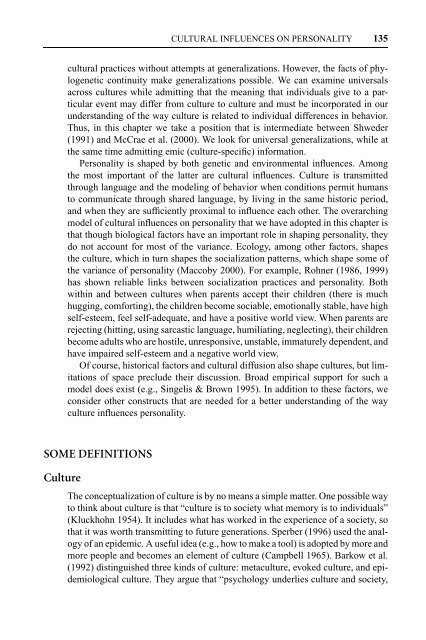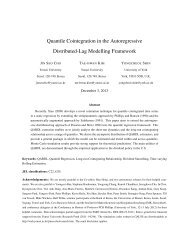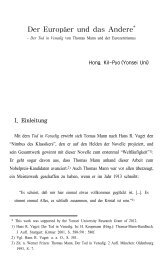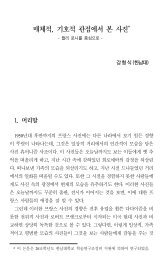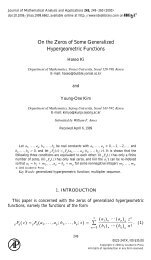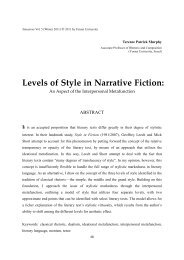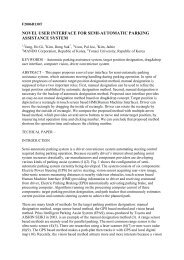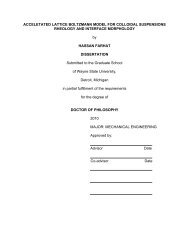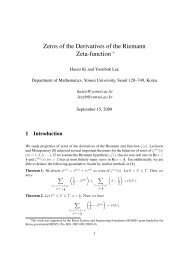CULTURAL INFLUENCES ON PERSONALITY Harry C. Triandis1 ...
CULTURAL INFLUENCES ON PERSONALITY Harry C. Triandis1 ...
CULTURAL INFLUENCES ON PERSONALITY Harry C. Triandis1 ...
You also want an ePaper? Increase the reach of your titles
YUMPU automatically turns print PDFs into web optimized ePapers that Google loves.
<strong>CULTURAL</strong> <strong>INFLUENCES</strong> <strong>ON</strong> PERS<strong>ON</strong>ALITY 135<br />
cultural practices without attempts at generalizations. However, the facts of phylogenetic<br />
continuity make generalizations possible. We can examine universals<br />
across cultures while admitting that the meaning that individuals give to a particular<br />
event may differ from culture to culture and must be incorporated in our<br />
understanding of the way culture is related to individual differences in behavior.<br />
Thus, in this chapter we take a position that is intermediate between Shweder<br />
(1991) and McCrae et al. (2000). We look for universal generalizations, while at<br />
the same time admitting emic (culture-specific) information.<br />
Personality is shaped by both genetic and environmental influences. Among<br />
the most important of the latter are cultural influences. Culture is transmitted<br />
through language and the modeling of behavior when conditions permit humans<br />
to communicate through shared language, by living in the same historic period,<br />
and when they are sufficiently proximal to influence each other. The overarching<br />
model of cultural influences on personality that we have adopted in this chapter is<br />
that though biological factors have an important role in shaping personality, they<br />
do not account for most of the variance. Ecology, among other factors, shapes<br />
the culture, which in turn shapes the socialization patterns, which shape some of<br />
the variance of personality (Maccoby 2000). For example, Rohner (1986, 1999)<br />
has shown reliable links between socialization practices and personality. Both<br />
within and between cultures when parents accept their children (there is much<br />
hugging, comforting), the children become sociable, emotionally stable, have high<br />
self-esteem, feel self-adequate, and have a positive world view. When parents are<br />
rejecting (hitting, using sarcastic language, humiliating, neglecting), their children<br />
become adults who are hostile, unresponsive, unstable, immaturely dependent, and<br />
have impaired self-esteem and a negative world view.<br />
Of course, historical factors and cultural diffusion also shape cultures, but limitations<br />
of space preclude their discussion. Broad empirical support for such a<br />
model does exist (e.g., Singelis & Brown 1995). In addition to these factors, we<br />
consider other constructs that are needed for a better understanding of the way<br />
culture influences personality.<br />
SOME DEFINITI<strong>ON</strong>S<br />
Culture<br />
The conceptualization of culture is by no means a simple matter. One possible way<br />
to think about culture is that “culture is to society what memory is to individuals”<br />
(Kluckhohn 1954). It includes what has worked in the experience of a society, so<br />
that it was worth transmitting to future generations. Sperber (1996) used the analogy<br />
of an epidemic. A useful idea (e.g., how to make a tool) is adopted by more and<br />
more people and becomes an element of culture (Campbell 1965). Barkow et al.<br />
(1992) distinguished three kinds of culture: metaculture, evoked culture, and epidemiological<br />
culture. They argue that “psychology underlies culture and society,


